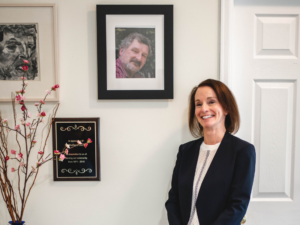Keeping Connected in Mental Health Therapy During COVID

Peggy Caspari, MA, LPC, RN, Colorado Recovery Executive Director
After suffering through two years of COVID-19, the mental health of many Americans is in a bad place. According to the just-released Mental Health Index: US Worker Edition, cases of post-traumatic stress disorder (PTSD), depression, and addiction are soaring amid the current Omicron surge of the pandemic.
An alarming one in four American workers screened positive for post-traumatic stress disorder (PTSD)—that’s a 54 percent increase in just the past three months and 136 higher than levels before the pandemic. Depression is also surging—up 87 percent since the fall and 63 percent higher than before COVID.
“We expect mental health declines around the holidays; however, nothing of this sheer magnitude,” said Mathew Mund, the CEO of Total Brain, one of the partners publishing the Index. “We see a very troublesome surge in mental health concerns at a time when Omicron begins to grip the nation; workplace vaccine mandates are put in place, and the holiday season is in full swing. Employers must be prepared to address trauma in the workplace.”
Colorado Recovery has been addressing this kind of stress for clients and their staff throughout the pandemic. “There’s just a lot going on in the world. The fears around the pandemic, anxiety, the inability to travel—it’s affecting everyone, our clients and our staff,” said Peggy Caspari, MA, LPC, RN, Colorado Recovery’s executive director. “People worry about how sick they might get and about the possibility of giving COVID to their children. These are complicated scenarios and different individuals react differently to them.” Caspari said. “There’s a lot of anxiety and unfortunately anxiety is contagious. It can easily be transmitted to co-workers and clients.”
To counter any stress they may experience, Colorado Recovery staff practice being calm. It has been said, “If you remain calm in the midst of great chaos, it is the surest guarantee that it will eventually subside.”
At Colorado Recovery, “we practice calm in our lives so we can counteract anxiety,” said Caspari. “That way we will get through this together and we will help each other. We avoid catastrophizing and remain calm internally.“ Individuals who catastrophize become anxious as they overestimate the likelihood of a poor outcome.
Not projecting their own anxiety is especially important for therapists working with people who have a mental illness. “We the helpers have to meet our clients with calmness and convey the message ‘we will get through this together’ instead of spreading toxic anxiety which is not helpful.”
With a bit of luck and solid mitigation measures, Colorado Recovery was able to continue serving clients while preventing COVID cases on its campus—until December. After two clients tested positive, they had to isolate themselves in their rooms. It was a tough challenge given that Colorado Recovery’s treatment approach emphasizes social connections which are at the core of its Warner model.
Fortunately, staff and clients were able to rise to the occasion. “It was interesting to witness the creativity brought on by this challenge,” remembered Caspari. In order to counteract the forced isolation, “they played board games on Zoom. They did art projects with our art therapist on Zoom. They did their group therapy sessions remotely. The vocational therapist did game nights with them online.”
This situation lasted ten days before they were cleared to rejoin in-person activities. But the team at Colorado Recovery was adamant to mitigate the isolation and provide connections with therapists and peers to minimize emotional stress all around.
“The groups were determined to keep going and they were very creative in order to achieve that. They were just amazing,” Caspari said. “It was a little bit of a roadblock but they worked through it.”
The treatment program at Colorado Recovery aims to empower adults with mental illness, and those who support them, with an unrelenting optimism for recovery, purposeful involvement in the community, and an enhanced sense of meaning in life.
Our treatment facility provides the services needed to address schizophrenia, bipolar disorder, and other serious mental illnesses which are specific to each individual. Call us at 720-218-4068 to discuss treatment options for you or the person you would like to help.





